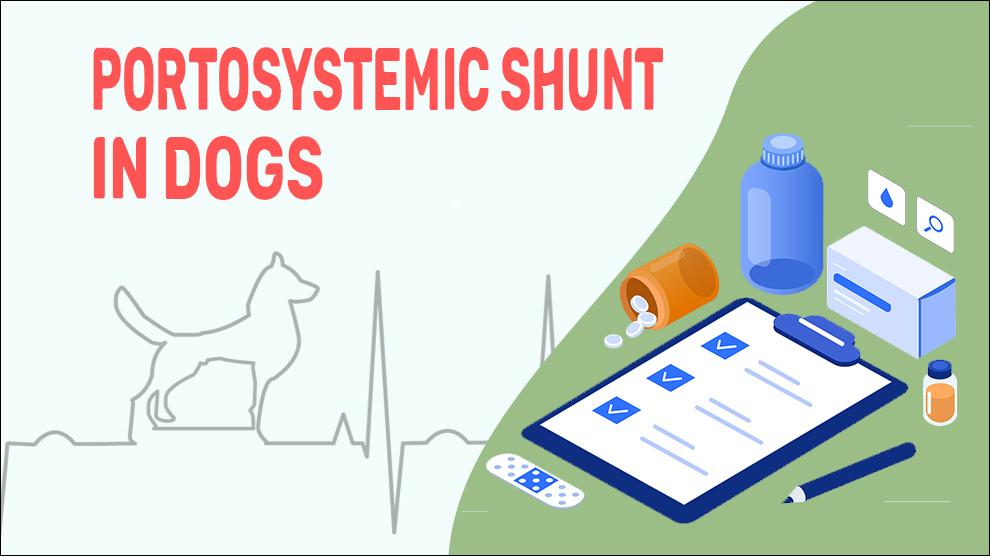Portosystemic Shunt (PSS) is a developmental error in utero causing an unusual connection between the systemic circulation and portal vascular system allowing portal blood to bypass liver sinusoids and enter directly into the systemic circulation. Exogenous drugs, hormones, Toxins, nutrients, and escaping bacteria, also evade the liver resulting in hepatic encephalopathy (HE).
Portal blood from the splanchnic circulation which should be supplied to the liver by the tributary or branch of the portal vein is actually shunted (by the PSS) to the systemic venous circulation.
Congenital shunts are of two types, intrahepatic (inside the liver) and extrahepatic (outside the liver). Portosystemic shunts are congenital most of the time, but occasionally portosystemic shunts may occur secondary to problems with the liver such as hepatic cirrhosis (acquired shunts).
Hepatic growth and size are maintained by hepatotropic hormones (glucagon, insulin) and normal portal blood flow (80% of the total liver blood flow). The presence of a shunt deprives the liver of factors that improve the development of the liver (hepatotropic factors) and this result in hepatic atrophy (failure of the liver to attain its usual size and mass). Hepatic insufficiency is a common consequence of hepatic atrophy, which together with the circulating nutrients, proteins and toxins result in hepatic encephalopathy.
Symptoms Of Portosystemic Shunt
- Stunted growth
- Vomiting
- Bloating or abdominal pain
- Walking in circles
- Pacing
- Staggering
- Aggression
- Drooling
- Compulsive behavior
- Apathy
- Hysteria
- Feelings of abdominal fullness
- Lethargy
- Nausea and vomiting
- Excessive thirst/urination
Treatment Options For Portosystemic Shunt
- Nutritional therapy and Intravenous fluid therapy will help your dog not become heavily dehydrated.
- Anti-inflammatory or immunosuppressive medications.
- For congenital extrahepatic portosystemic shunts- Portosystemic shunt ligation can help by total ligation or partial shunt ligation by cutting off the shunt to support blood flow back into the liver.
- Liver surgery may be required to treat some causes of liver dysfunction, such as vascular anomalies, cancer, or cysts.
- Pain-relieving medications: DERAMAXX, DOXIDYL, PREVICOX, GALLIPRANT.
Home Remedies For Portosystemic Shunt
- Choose the food with high nutritious value, like vegetables, fruits, and real meat – and throw out the foods with grain fillers as the first ingredients.
- Consult your vet for a pet food recommendation if you aren’t sure where to start.
- If your dog is has a very sedentary lifestyle or overweight, consider working more exercise into their daily routine.
Prevention Of Portosystemic Shunt
PSS etiology is not yet understood completely. The pets’ prognosis for healing will depend on the findings made by a veterinarian. There’s not much a pet owner can do to prevent them as Hereditary is a factor in some breeds but a high-quality diet with health supplements may help somehow or other.
Affected Breeds Of Portosystemic Shunt
Australian Cattle Dog, Bedlington Terrier, Cocker Spaniel, Chihuahua, Cairn Terrier, Doberman Pinscher, Golden Retriever, Labrador Retriever, Irish Wolfhound, Maltese, Miniature Schnauzer, Old English Sheepdog, Skye Terrier, Standard Poodle, Springer Spaniel, West Highland White Terrier, Yorkshire Terrier, Beagle
Additional Facts For Portosystemic Shunt
1. Cause:
- Congenital
- Cardiovascular defects
- Progressive liver failure
- Diabetes mellitus
- Glycogen storage disease
- Hypoadrenocorticism/Hyperadrenocorticism
- Hydrocephalus
- Hypothyroidism
- Hypopituitarism
- Kidney disease
- Malnutrition
2. Types :
1. Congenital shunts:
Intrahepatic (inside the liver) and extrahepatic (outside the liver).
2. Acquired shunts:
This may occur secondary to problems with the liver such as hepatic cirrhosis.
3. Mortality:
PSS is a multifactorial condition that includes a continuum or spectrum of diseases that ranges from a severe form of the disease with several symptoms and a subtle condition with no outward signs that can result in life-threatening complications.
4. Diagnosis:
- Routine hematology, blood smears
- Urinalysis
- Blood ammonia
- Ultrasound
- MRI
- CT scan
- Blood tests to determine parasitic infection
5. Prognosis:
Since there is no proper cure, veterinarians usually give recommendations for control or management of the problem. PSS has a poor to guarded prognosis. If Left untreated, PSS is often life-threatening, but luckily, dogs can have a relatively normal life expectancy with proper treatment and disease management.
When To See A Vet
Contact your vet right away, if you notice:
- Stunted growth
- Vomiting
- Bloating or abdominal pain
Food Suggestions For Portosystemic Shunt
- Protein - Lean chicken or turkey breast, lean beef, and Cooked fish (salmon, tuna).
- Raw meaty bones, raw chicken wings, or lamb flaps.
- Plant-based protein sources – Lentils, Chickpeas, potatoes, other Nuts, and Seeds.
- Vitamin C foods – Strawberries, citrus fruits, potatoes, tomatoes.
- Antioxidants – Blueberries, Cauliflower, Beets, Beans, etc.
- Cooked spinach and potatoes.
Conclusion
After being diagnosed with PSS, it’s possible for pets to enjoy a good quality of life for years. Strictly follow the veterinarian's recommendations of any therapeutic diet or nutritional supplements to manage the condition.

















